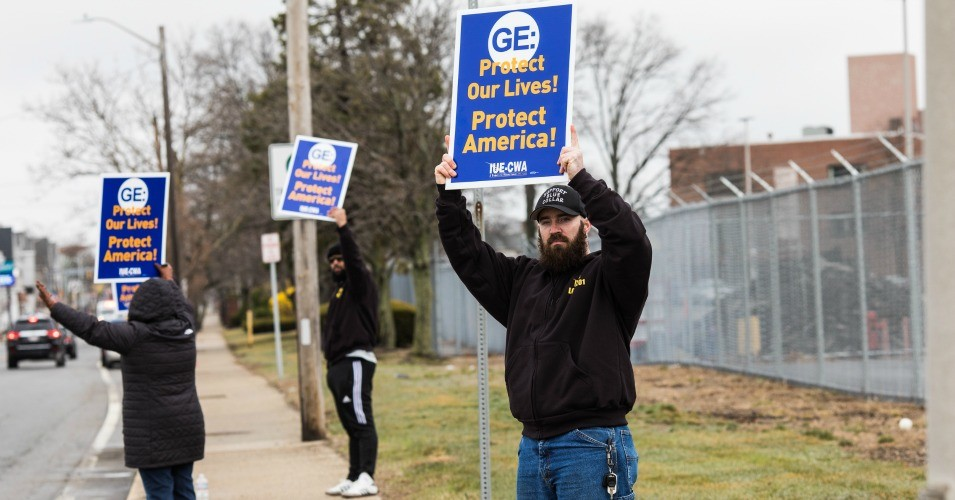
General Electric workers in Lynn, Massachusetts called on the company to allow them to build badly-needed ventilators rather than laying off thousands of employees. (Photo: IUE-CWA)
By Julia Conley, Common Dreams | March 30, 2020
Workers at a jet engine factory in Lynn, Massachusetts stood six feet apart at a protest outside the facility, following social distancing guidelines while calling on General Electric (GE) to reverse its recent decision to lay off thousands of workers and instead put them to work building badly-needed ventilators for coronavirus patients. In nearby Boston, GE employees also marched six feet apart to their company’s headquarters with the same demand.
The workers’ show of solidarity with coronavirus patients and the healthcare providers desperately trying to save lives was applauded by labor advocates on social media.
GE announced last week it was laying off nearly 2,600 workers—10% of its domestic aviation workforce—as the coronavirus pandemic sharply reduced demand in the aviation industry. The layoffs would help GE save between $500 million and $1 billion, the company said, while GE Healthcare, one of the country’s largest producers of ventilators, would step up its efforts to produce the supplies.
Sen. Bernie Sanders (I-Vt.) expressed solidarity with the workers and demanded GE end all “layoffs, outsourcing, and tax dodging” and instead invest its vast resources in serving the public, particularly during the national crisis.
With hospitals across the country reporting a shortage of ventilators and Dr. Anthony Fauci, director of the National Institute of Allergy and Infectious Diseases, warning that 100,000 to 200,000 Americans could die of the coronavirus, officially known as COVID-19, the GE workers demanded that their skills be put to good use and that the company use all its resources to alleviate the critical shortage.
“The crisis we face with the COVID-19 pandemic is unlike anything we have seen in our lifetimes. It requires us—all of us—to work for the common good and save lives,” said Chris Shelton, president of Communications Workers of America (CWA), which represents GE workers. “But at a time when our country is depending on skilled workers to make essential products like ventilators, our members are left wondering why they are facing layoffs instead of having the opportunity to use their skills to help save lives. We challenge GE to partner with our members and the management of its own Aviation and Electronic Lighting divisions to convert some of its unused capacity to alleviate our critical national shortage of life-saving ventilators.”
The GE protest demonstrates, one public school teacher tweeted, that Americans must look to workers, not billionaires, “to save us.”
“Companies don’t give a shit about us. The workers do,” wrote comedian Hari Kondabolu.
Combined with demands for paid sick leave from Amazon and Whole Foods employees; for better safety precautions by Instacart delivery workers and Pittsburgh sanitation workers; and a number of other protests at workplaces across the country in recent weeks, brought on by the COVID-19 pandemic, the GE workers may be an integral part of a new era for the U.S. labor rights movement, wrote legal scholar Tiffany C. Li.
“This is how movements begin,” Li wrote.
